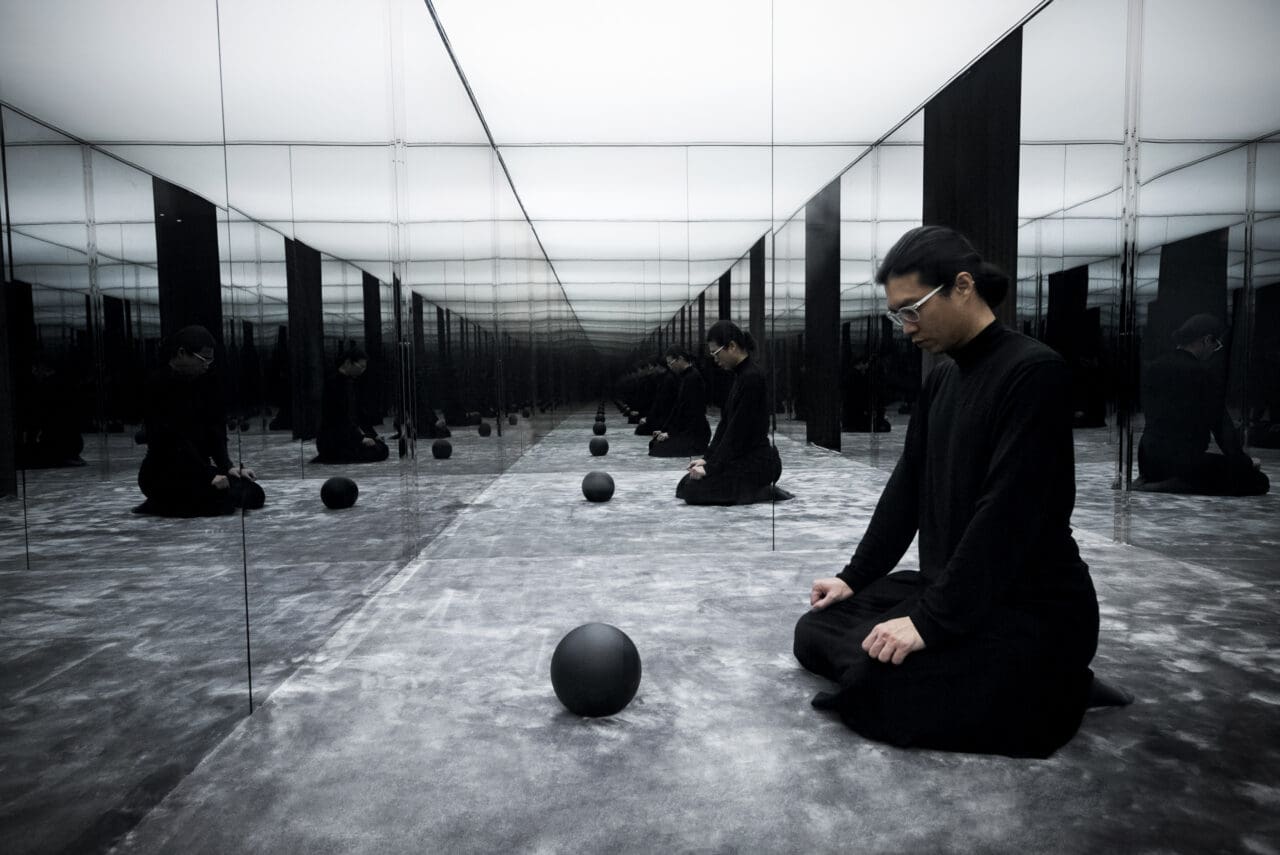Vicky Lau
Tate Dining Room
Vicky Lau is reticent when it comes to explaining her thoughts, which makes it all the more appropriate that poetry and cooking serve as conduits for her experiences. Chilean poet Pablo Neruda is an oft-cited influence of hers, who was renowned for his many odes to seemingly mundane ingredients. Fittingly, Lau’s ‘Ode to Love’ reflects not a moment in time, but the jumble of sensations that floods the body in the heat of infatuation. “A first love is about exposing yourself for the first time and being vulnerable,” she says. “The first time that you do that is very raw and it’s all about the heart.”
Here, a raw sliver of pigeon meat alludes to this all-important organ, complete with arteries (in actuality, lettuce dipped in beetroot juice) and rudely exposed for all to see. A maraschino cherry and beetroot rose recall the saccharine initial stages of romance, while shards of glass warn of the confrontation with the self when those feelings inevitably sour. Paired together, these ingredients comprise a flavour profile that is sweet and savoury, as our memories of our own first romances so often are when mellowed by the lens of time.
Tate Dining Room, 210 Hollywood Rd, Sheung Wan; 2555 2172, tate.com.hk
Eric Räty
Arbor
It all began, quite naturally, with a compliment. At 14 years of age, the young Finn had created a technically impressive white panna cotta with citrus and passionfruit for a home economics class, earning him effusive praise from his teacher and and a firm encouragement to stick with cooking. Later, at a formative stint at Helsinki’s Restaurant Chez Dominique, Räty rode the wave of Japanese culinary influences that was beginning to seep into the Scandinavian food scene at the time, a sensibility he later honed at the Ritz-Carlton Wolfsburg and Cafe Gray Deluxe at The Upper House. Today, the succinctly-named ‘Citrus’ recalls Räty’s first formative creation with a sorbet of pink grapefruit, sea buckthorn berry and kintoki carrot, paired with yuzu cream, lightly toasted citrus marshmallows, shavings of Japanese kinkan kumquat and kintoki sweet carrot, and white chocolate powder. A sprinkling of lemon balm, chrysanthemum and marigold petals adds a final dash of citrus, for a stroke of pure zesty delight.
Arbor, 25/F, H Queen’s, 80 Queen’s Rd Central; 3185 8388, arbor-hk.com
Jim Löfdahl
Frantzen’s Kitchen
Even by Swedish standards, Jim Löfdahl’s childhood was more idyllic than most. Think long summers spent at the family cabin deep in the forests outside Stockholm, growing carrots and onions in a plot of land beside, and foraging for all manner of lingonberries, cloudberries and wild mushrooms. “I got 10 Swedish kroner for every ten litres of berries, so I picked a lot of berries!” he reminisces with a chuckle. “The strongest memories of my childhood came from eating those seasonal fruits and vegetables.” While Hong Kong is worlds apart from rural Sweden, Löfdahl’s memories continue to inform his cooking at Frantzen’s Kitchen.
A fixture on the tasting menu is ‘Seven Gardens,’ a seasonal dish that sources vegetables from seven organic farms in the New Territories – a necessity to achieve the desired variety of ingredients given the city’s land shortage and, therefore, the limited space of each farm to grow crops. This iteration incorporates the vegetables of the season in a riotous profusion of colour, where kohlrabi, snow fungus, Swiss chard, aloe vera, heirloom carrots, radishes and turnips are braised, fried, roasted and whipped up into a variety of creams and emulsions that pays tribute to the underdog farmers of Hong Kong, and late Swedish summers from a past life.
Frantzen’s Kitchen, 11 Upper Station St, Sheung Wan; 2559 8508, frantzenskitchen.com
Vicky Cheng
VEA Restaurant & Lounge
Every Hongkonger knows the lyrics to George Lam’s 1996 love anthem ‘Fen Fen Zhong Xu Yao Ni (分分鐘需要你)’ by heart, but to chef Vicky Cheng they hold special significance. “My wife Polly asked me to sing at our wedding four years ago but I refused. About two years ago, I finally sang my first song for her,” he recalls. The song would later form the foundation, quite literally, for one of VEA’s tasting dishes, which is based on the salted fish and Napa cabbage mentioned within – two traditional ingredients that are simple yet ubiquitous in Cantonese home cooking. Here, they serve as a metaphor for the magic that a romance injects into the mundane.
As a result, the dish is served in a custom wooden tray with a speaker built into the base that plays a tinkling version of this classic. What exactly it contains changes with the seasons, but salted fish and Napa cabbage are always a constant. In this iteration, Cheng presents a two-way interpretation: fried salted fish is folded into a house-made palmier pastry, which is then finished with green dots of cabbage purée with scallion and coriander in a display of French techniques using Chinese ingredients. Demonstrating the opposite is a ‘jian dui’ (煎堆) fried Chinese pastry filled with French cabbage cream and bits of salted fish. To finish, a cabbage tea is poured table-side and strained through a delicate skeleton leaf to balance the saltiness of the dish with its own sweet and bitter notes. The result: an epicurean love ballad that even George Lam would be proud of.
VEA Restaurant & Lounge, 29-30/F, 198 Wellington St, Central; 2711 8639, vea.hk
Hidemichi Seki
Tenku Ryugin
Born and raised in the Japanese prefecture of Saitama, Hidemichi Seki nevertheless grew up in a Chinese culinary enclave of sorts thanks to his father, who ran a Cantonese restaurant and immersed his son in the flavours of faraway Hong Kong from an early age. Showing a talent for making dumplings, it was only natural that Seki’s childhood dream was to become a dim sum chef. Today, he has surpassed his own expectations: as the head chef of the two-Michelin-starred Tenku Ryugin high above Victoria Harbour, he strikes a middle path between the intricate technique of his home country and the rich flavours of his father’s Chinese cooking.
This ‘Kuruma-ebi’ dish lies at the intersection of these two cuisines. A reinterpretation of the Shanghainese drunken crab that he tasted when he first arrived in Hong Kong, Seki begins by marinating a tiger prawn in 12-year aged Xiaoxing wine infused with kombu and local preserved plum. It is then chilled before being deep-fried in its shell for several seconds, both to lock in the flavours as well as to preserve the freshness of the raw prawn meat within. Served with drunken prawn tartare and French caviar, the dish is finished with a double sprinkling of porcini powder and Japanese plum powder for the perfect balance of sweetness, acidity, and umami.
Tenku Ryugin, 101/F, ICC, 1 Austin Rd West, Tsim Sha Tsui; 2302 0222, ryugin.com.hk
Editor
Gavin YeungCredit
Photography: Samantha Sin








